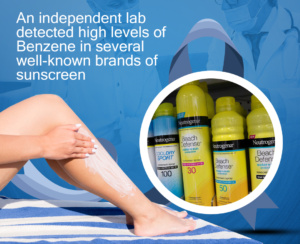Johnson & Johnson Sunscreen
 Johnson & Johnson has issued a recall of its sunscreen which contains Benzene which even at very low levels, is a major risk factor for blood tissue cancers such as leukemia, myeloma, and lymphoma.
Johnson & Johnson has issued a recall of its sunscreen which contains Benzene which even at very low levels, is a major risk factor for blood tissue cancers such as leukemia, myeloma, and lymphoma.
According to experts, no safe level of Benzene can exist in sunscreen without being a risk.
Most of the Johnson & Johnson recalled sunscreens are Neutrogena and Aveeno products and contain enough Benzene to cause different forms of cancer with repeated exposure.
Have you been exposed to benzene in sunscreen and diagnosed with cancer? You may be entitled to compensation. Our team is available to help you figure out if you qualify to file a claim.
Benzene Discovered in Sunscreen
In May 2021, an independent lab detected high levels of benzene in several different brands of sunscreen and after-sun care products. Benzene is a toxic chemical and a known carcinogen — meaning that benzene can cause cancer in humans.
Benzene was found in 27 percent of samples tested by researchers, including many well-known sunscreen brands, including Neutrogena, CVS Health, Banana Boat, and Walgreens.
Certain batches of sunscreen studied contained up to three times more benzene than the FDA’s concentration limit of 2 parts per million (ppm).
According to Valisure (the independent lab testing sunscreen products):
“The presence of this known human carcinogen [benzene] in products … regularly used by adults and children is very troubling.”
In a statement, the lab also urged public health authorities to further regulate the use of benzene in sunscreen and after-sun care products.
“Being that many of the tested sunscreen and after-sun care products did not contain detectable levels of benzene, it does not appear that benzene use is unavoidable for their manufacture … therefore, any significant detection of benzene should be deemed unacceptable.”
What Sunscreens Contain Benzene?
Sunscreen and after-sun care brands containing benzene include:
- Aveeno
- Babyganics
- Banana Boat
- CVS Health
- EltaMD
- Equate
- Ethical Zinc
- Fruit of the Earth
- LaRoche-Posay
- Live Better by CVS Health
- Max Block
- Neutrogena
- Raw Elements
- Sun Bum
- TopCare Everyday
- Walgreen’s
The lab, Valisure, has urged the U.S. Food and Drug Administration (FDA), which regulates sunscreen products, to issue a sunscreen recall due to the elevated levels of benzene detected.
Benzene Cancer Risk
Benzene is a known carcinogen, meaning it can cause cancer in humans. According to a 2010 review of benzene research:
“There is probably no safe level of exposure to benzene, and all exposures constitute some risk.”
Further troubling is FDA research, which has found that chemicals in sunscreen products (which may include benzene) are “found in the blood at high levels after application to the skin,” according to Valisure’s report.
Click here to review the Valisure report
What Kind of Cancer Does Benzene Cause?
Human studies and animal lab testing has confirmed that benzene causes cancer, and according to the American Cancer Society, the link between benzene and leukemia and other blood cancers is especially strong.
According to the ACS, “Rates of leukemia, particularly acute myeloid leukemia (AML), have been found to be higher in studies of workers exposed to high levels of benzene, such as those in the chemical, shoemaking, and oil refining industries.”
Benzene in sunscreen may also increase the risk of cancer, including leukemia and other blood cancers.
Research has found a possible link between benzene and various types of cancer, including:
- Leukemia
- Acute myeloid leukemia (AML)
- Acute lymphocytic leukemia (ALL)
- Chronic lymphocytic leukemia (CLL)
- Multiple myeloma
- Non-Hodgkin lymphoma
According to Dr. Christopher Bunick, associate professor of dermatology at Yale University, “There is not a safe level of benzene that can exist in sunscreen products.”
